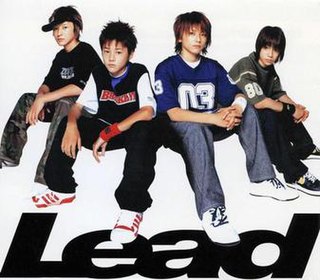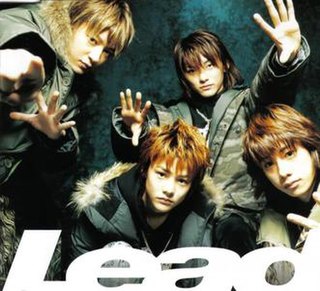Lead is a Japanese hip-hop dance and vocal group, initially formed under the name Rhymix in Osaka, Japan in March 2002. They went through two name changes before debuting as "Lead" in May 2002 under the Pony Canyon sub-label Flight Master. The group consists of Shinya Taniuichi, Keita Furuya, Akira Kagimoto and, formerly, Hiroki Nakadoi.

"Unmei no Roulette Mawashite" is Zard's 25th single released on September 17, 1998, under B-Gram Records label. The single reached #1 rank during the first week after being released. It charted for 9 weeks and sold 247,000 copies. When Izumi Sakai died, it was elected as her fourth best song on the Oricon polls.

Dream "A"live is the eighth studio album by Japanese boy band, Arashi. The album was released on April 23, 2008, in Japan under their record label J Storm in two editions: a limited 2CD version and a regular CD version. Dream "A"live is the 30th best-selling album of 2008 in Japan. As of July 2010, the album is the group's third highest-selling album after their tenth anniversary album All the Best! 1999–2009 and debut album Arashi No.1 Ichigou: Arashi wa Arashi o Yobu!. It was released digitally on February 7, 2020.
Aiko Kitahara (北原愛子) is a former Japanese pop singer and songwriter under the Giza Studio label.

"Manatsu no Magic" is the debut single by Japanese hip-hop group Lead released on July 31, 2002. The single debuted on Oricon at #18 and remained on the charts for five weeks. The success of the single and their following single, "Show Me the Way", helped them win the Best Newcomer Award during the 44th Japan Record Awards, alongside Day After Tomorrow, Mika Nakashima and Sachika Shino.

Brand New Era is the second studio album by Japanese hip-hop group Lead on August 25, 2004. The album charted at No. 11 on the Oricon charts and remained on the charts for three weeks. Bonuses with the album included one of four possible posters, a remix of their song "Night Deluxe" and a specialized URL to allow buyers to download original wallpapers.

Lead Tracks: Listener's Choice is the first compilation album by Japanese hip-hop group Lead. It was their lowest charting album, only reaching No. 67 on Oricon and dropping off of the charts by the second week.

"Show Me the Way" is the second single by the four-member Japanese hip-hop group Lead, released on October 17, 2002. It charted better than their debut single, ranking in the top ten on the Oricon charts at #7.

Fly Away is the third single by Japanese hip-hop group Lead. It peaked in the top ten on the Oricon charts at #10 and remained on the charts for seven weeks, charting longer than their previous singles.

Funky Days! (ファンキーデイズ!) is the fourth domestic single by Japanese hip-hop group Lead, released on July 30, 2003. It was their first to be released after their debut studio album Life On Da Beat, bringing in their new era of Brand New Era (2004). The single charted well on the Oricon charts at #10 and remained on the charts for five weeks.
The discography of Japanese hip-hop group Lead includes 9 studio albums, 1 compilation album, 1 remix album, 16 live albums and 32 singles. Their first sixteen singles were released under the Pony Canyon sub-label Flight Master; since, their singles have been strictly under Pony Canyon.

Get Wild Life is the fifth single by Japanese hip hop group Lead released on December 3, 2003. The single peaked in the top ten on the Oricon charts, ranking at #9 for the week, and remained on the charts for seven weeks.

Lead Movies 1 is the first compilation video release by the Japanese hip-hop group Lead. The compilation ranked at #11.

1st Live Tour ~Brand New Era~ is the first concert video release by the Japanese hip-hop group Lead. It was released on both DVD and VHS on November 17, 2004. It managed to peak in the top ten on Oricon at No. 9.

Lead Upturn 2018: Milestone is the twenty-first video and fifteenth overall concert video released by Japanese hip-hop group Lead. The concert video was released on December 19, 2018. It debuted at No. 17 on the Oricon DVD chart, becoming their highest debuting concert video release.

10th Anniversary Tour Lead Upturn 2012 ~Now or Never~ is the tenth anniversary concert DVD released by the Japanese hip-hop group Lead one year after their previous concert DVD on December 26, 2012. It charted at #38 on the Oricon charts, remaining on the charts for one week.
The Japanese group Lead has released over forty music videos since their debut in 2002. They debuted as a hip-hop group with the music video "Manatsu no Magic" on July 31, 2002. In other visual media, the group has been a part of several films and television shows. In 2003, all four members appeared in the film Boutaoshi!, with Shinya taking on the lead role of Tsuguo Takayama. All four members also appeared in the 2004 film Kamachi. Along with performing the theme song "Get Wild Life", Shinya took on the role of the title character and Hiroki was featured as the troubled teen Shun Iijima. In 2014, Shinya took the role of Tsuyoshi Kakinoki for the movie Oretachi no Ashita.
The music of the 2004 anime series Samurai Champloo, created by the studio Manglobe, was produced by a team of four composers drawn from the hip hop musical scene. They were Shinji "Tsutchie" Tsuchida of Shakkazombie, Fat Jon, Nujabes and Force of Nature. The musical direction was chosen by series creator and director Shinichirō Watanabe as part of his planned blending of hip hop culture with the anime's setting in the Edo period, additionally incorporating contributions from guest artists. The opening theme "Battlecry" was performed and co-written by Shing02, while the various ending themes were performed by Minmi, Kazami, and Azuma Riki. The final episode's ending theme was "San Francisco", licensed from the rapper band Midicronica.

Lead the Best "Michishirube" is the second compilation album by Japanese hip hop group Lead, released on July 31, 2022. The album debuted at No. 6 on Oricon.
Feel the Fate is the second single by the three-member Japanese hip-hop group w-inds, released on July 4, 2001. It charted better than their debut single, ranking in the top ten on the Oricon charts at No. 8.














